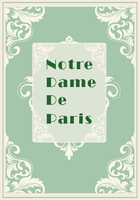
第86章 BOOK Ⅵ(13)
'Ah,these bishops,'grumbled Gervaise;'because they are learned,forsooth,they can never do anything like other folks!Think of it,Oudarde—to put the devil among the foundlings!for of course the little monster was the devil.Well,Mahiette,and what did they do with him in Paris?I'll answer for it that no charitable person would have it.'
'I know not,'answered the lady of Reims.'It was just at the time when my husband purchased the office of clerk to the Court of Justice at Beru,two leagues distant from the city,and we thought no further of the story,particularly that just in front of Beru are the two little hills of Cernay,which hide the towers of the Cathedral from view.'
Meanwhile,the three worthy burgher wives had reached the Place de Grève.Absorbed in conversation,however,they had passed the public breviary of the Tour-Roland without noticing it,and were directing their steps mechanically towards the pillory round which the crowd increased from moment to moment.It is possible that the sight which at that instant drew all eyes towards it would have completely driven the Rat-Hole and the pious halt they intended making there from their minds,had not fat,six-year-old Eustache,dragging at Mahiette's side,recalled it to them suddenly.
'Mother,'said he,as if some instinct apprised him that they had left the Rat-Hole behind,'now may I eat the cake?'
Had Eustache been more astute,that is to say,less greedy,he would have waited,and not till they had returned to the University,to Maitre Andry Musnier's house in the Rue Madame-la-Valence,and he had put the two arms of the Seine and the five bridges of the city between the Rat-Hole and the cake,would he have hazarded this question.
Imprudent though the question was on Eustache's part,it recalled his mother to her charitable purpose.
'That reminds me,'exclaimed she,'we were forgetting the nun!Show me this Rat-Hole of yours,that I may give her the cake.'
'Right gladly,'said Oudarde;'it will be a charity.'
This was quite out of Eustache's reckoning.
'It's my cake!'said he,drawing up first one shoulder and then the other till they touched his ears—a sign,in such cases,of supreme dissatisfaction.
The three women retraced their steps and presently reached the Tour-Roland.
Said Oudarde to the other two:'We must not all look into the cell at once,lest we frighten the recluse.Do you two make as if you were reading Dominus in the breviary,while I peep in at the window.The sachette knows me somewhat.I will give you a sign when you may come.'
Accordingly,she went alone to the window.As her gaze penetrated the dim interior,profound pity overspread her countenance,and her frank and wholesome face changed as suddenly in expression and hue as if it had passed out of the sunshine into moonlight.Her eyes moistened and her lips contracted as before an outbreak of tears.The next moment she laid her finger on her lips and signed to Mahiette to come and look.
Mahiette advanced,tremulous,silent,on tip-toe,as one approaching a death-bed.
It was,in truth,a sorrowful spectacle which presented itself to the eyes of the two women,as they gazed,motionless and breathless,through the barred aperture of the Rat-Hole.
The cell was small,wider than it was deep,with a vaulted,Gothic ceiling,giving it much the aspect of the inside of a bishop's mitre.Upon the bare flag-stones which formed its floor,in a corner a woman was seated,or rather crouching,her chin resting on her knees,which her tightly clasped arms pressed close against her breast.Cowering together thus,clothed in a brown sack which enveloped her entirely in its large folds,her long,gray hair thrown forward and falling over her face along her sides and down to her feet,she seemed,at the first glance,but a shapeless heap against the gloomy background of the cell,a dark triangle which the daylight struggling through the window divided sharply into two halves,one light,the other dark—one of those spectres,half light,half shade,such as one sees in dreams,or in one of Goya's extraordinary works—pale,motionless,sinister,crouching on a tomb or leaning against the bars of a prison.You could not say definitely that it was a woman,a man,a living being of any sort;it was a figure,a vision in which the real and the imaginary were interwoven like light and shadow.Beneath the hair that fell all about it to the ground,you could just distinguish the severe outline of an emaciated face,just catch a glimpse under the edge of the garment of the extremity of a bare foot,clinging cramped and rigid to the frozen stones.The little of human form discernible under that penitential covering sent a shudder through the beholder.
This figure,which might have been permanently fixed to the stone floor,seemed wholly without motion,thought,or breath.In that thin covering of sackcloth,in January,lying on the bare stones,without a fire,in the shadow of a cell whose oblique loophole admitted only the northeast wind,but never the sunshine,she seemed not to suffer,not even to feel.You would have thought she had turned to stone with the dungeon,to ice with the season.Her hands were clasped,her eyes fixed;at the first glance you took her for a spectre;at the second,for a statue.
However,at intervals,her livid lips parted with a breath and quivered,but the movement was as dead and mechanical as leaves separated by the breeze;while from those dull eyes came a look,ineffable,deep,grief-stricken,unwavering,immutably fixed on a corner of the cell which was not visible from without;a gaze which seemed to concentrate all the gloomy thoughts of that agonized soul upon some mysterious object.
Such was the being who,from her habitation,was called the recluse,and from her sackcloth garment,the sachette.